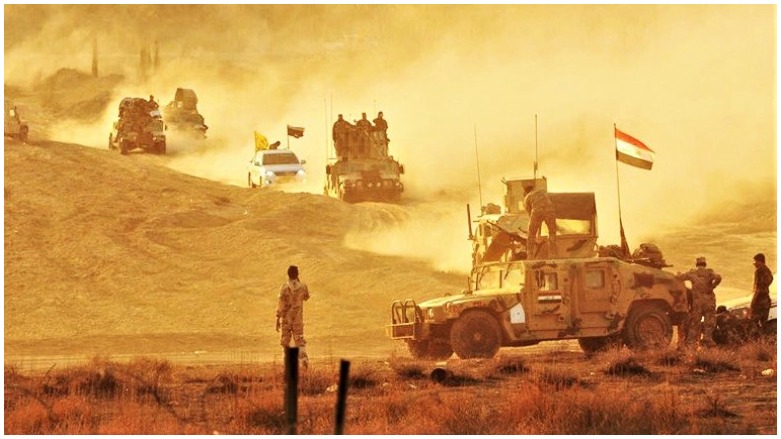WASHINGTON DC (Kurdistan 24) – In its annual report on terrorism, the State Department supported the complaint of the Kurdistan Regional Government (KRG) that ISIS is taking advantage of the lack of coordination between the Iraqi Security Forces and the Kurdish Peshmerga.
The State Department’s report on international terrorism, formally titled “Country Reports on Terrorism 2019,” was released on Wednesday. It explained that within the disputed territories, “ISIS continues to exploit the security vacuum between Iraqi Security Forces (ISF) and Peshmerga Forces.”
“Recent attacks in the northern Diyala and activities along Qarachogh Mountain indicate ISIS presence,” it said, but counterterrorism efforts “have been hampered by the lack of coordination between Peshmerga and ISF, mainly due to the relationship between the KRG and the Government of Iraq.”
Senior KRG figures have repeatedly made this point, including in their meetings with US officials, and on Thursday, Iraq’s new Defense Minister, Juma Inad Saadoun, met in Erbil with officials from the Kurdistan Region to address the problem.
The State Department report also provided statistics on ISIS attacks in Iraq. As of Dec. 1, ISIS had carried out 844 attacks, which killed 534 civilians in 2019 and injured over 1,121.
That is a large number, far greater, by comparison, than Western countries experience. Great Britain, for example, suffered one terrorist attack in 2019 that killed three people. France suffered three attacks, in which four people were killed and 16 were wounded, according to the State Department report.
That said, however, the number of terrorist attacks in Iraq in 2019 was less than in 2018, when 900 civilians died and 1,600 were injured, the report explained.
Syria’s Role in Sunni Terrorism
The report also noted that the regime of Bashar al-Assad had a “permissive attitude towards AQ (al Qaida) and other terrorist groups’ FTF (Foreign Terrorist Fighter) facilitation efforts” over the course of Iraq’s extended conflict.
“This fed the growth of AQ, ISIS, and affiliated terrorist networks inside Syria,” it said.
This observation raises questions about the effectiveness of the regime’s suppression of ISIS in areas under its authority. Speaking to reporters earlier this month, Amb. James Jeffrey, US Special Envoy for the Global Coalition to Defeat ISIS and Special Representative for Syria Engagement, stated, “We are concerned about Daesh elements south of the Euphrates in the areas that the regime and its Iranian and Russian supporters control.”
Iranian-backed Terrorism in Iraq
“Attacks by Iran-backed Shia militia groups on Iraqi bases hosting US and Defeat-ISIS Coalition forces increased in 2019,” the State Department report explained.
During 2019, there were over a dozen rocket or indirect fire attacks aimed at US or Coalition targets, including a Dec. 27 attack on the K-1 base, which killed a US contractor and wounded US and Iraqi troops. The report explained that the Iranian-backed Kata’ib Hizbollah had launched over 30 rockets at the Kirkuk base—the first time such a high figure has been cited, but which explains the seriousness of the casualties.
The US responded to that attack with “precision strikes against five targets associated with KH in Iraq and Syria,” the report said, and on Dec. 31, “Iran instigated an attack by demonstrators, including Iran-backed terrorists and militia members,” on the US embassy in Baghdad.
The confrontation between the US and Iran culminated in the assassination, on Jan. 3, of Qassim Soleimani, head of the Quds Force of Iran’s Islamic Revolutionary Guard Corps, as he arrived at Baghdad airport, followed by a Jan. 7 Iranian ballistic missile attack on two airbases in Iraq hosting Coalition forces. Since then, the Coalition has consolidated its presence into a few large bases, while bringing in Patriot missiles to protect the two bases that Iran targeted, Al Assad and Erbil.
In its “Strategic Dialogue” with Baghdad, the first session of which was held on June 7, Washington pressed the new Iraqi government to rein in the Iranian-backed militias.
Late on Thursday, Iraqi forces raided a Kata’ib Hizbollah base in southern Baghdad. They arrested at least 14 members of the group and seized at least 10 rockets, as Baghdad charged that the group was planning attacks on the Green Zone and Baghdad International Airport.
The State Department report also noted that some 1.4 million Iraqis remain internally displaced. Over half of them—some 800,000—are sheltering in the Kurdistan Region, as Prime Minister Masrour Barzani explained on Saturday, World Refugee Day.

